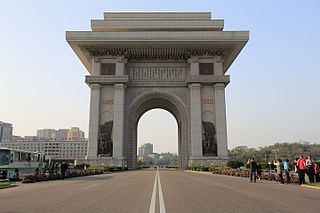
Pyongyang is the capital and largest city of North Korea, where it is sometimes labeled as the "Capital of the Revolution". Pyongyang is located on the Taedong River about 109 km (68 mi) upstream from its mouth on the Yellow Sea. According to the 2008 population census, it has a population of 3,255,288. Pyongyang is a directly administered city with a status equal to that of the North Korean provinces.
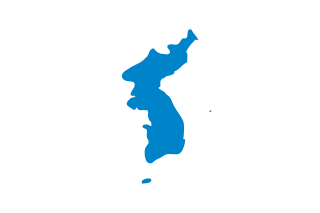
Korean reunification is the hypothetical unification of North Korea and South Korea into a singular Korean sovereign state. The process towards reunification of the peninsula while still maintaining two opposing regimes was started by the June 15th North–South Joint Declaration in June 2000, was reaffirmed by the October 4th Declaration in October 2007 and the Panmunjom Declaration in April 2018, and the joint statement of United States President Donald Trump and North Korean leader Kim Jong Un at the Singapore Summit in June 2018. In the Panmunjom Declaration, the two countries agreed to work to officially end the Korean conflict in the future.

The Korean conflict is an ongoing conflict based on the division of Korea between North Korea and South Korea, both of which claim to be the sole legitimate government of all of Korea. During the Cold War, North Korea was backed by the Soviet Union, China, and other communist allies, while South Korea was backed by the United States, United Kingdom, and other Western allies.
The music of North Korea includes a wide array of folk, popular, light instrumental, political, and classical performers. Beyond patriotic and political music, popular music groups like Pochonbo Electronic Ensemble and Moranbong Band perform songs about everyday life in the DPRK and modern light pop reinterpretations of classic Korean folk music. Music education is widely taught in schools, with President Kim Il Sung first implementing a program of study of musical instruments in 1949 at an orphanage in Mangyongdae. Musical diplomacy also continues to be relevant to the Democratic People's Republic of Korea, with musical and cultural delegations completing concerts in China and France in recent years, and musicians from Western countries and South Korea collaborate on projects in the DPRK.
Air Koryo is North Korea's flag carrier and only commercial airline. It is state-owned and controlled by the North Korean air force. Headquartered in Sunan-guyŏk, Pyongyang, it operates domestic and international routes – on a regular schedule only to Beijing, Shenyang, and Vladivostok – from its hub at Pyongyang’s Sunan International Airport. It also operates flights on behalf of the North Korean government, with one of its aircraft serving as North Korean supreme leader Kim Jong Un's personal plane. Its fleet consists of Ilyushin and Tupolev aircraft from the Soviet Union and Russia, and Antonovs from Ukraine.

The Pyongyang Metro is the rapid transit system in Pyongyang, the capital and largest city of North Korea. It consists of two lines: the Chollima Line, which runs north from Puhŭng Station on the banks of the Taedong River to Pulgŭnbyŏl Station, and the Hyŏksin Line, which runs from Kwangbok Station in the southwest to Ragwŏn Station in the northeast. The two lines intersect at Chŏnu Station.
The mass media in North Korea is amongst the most strictly controlled in the world. The constitution nominally provides for freedom of speech and the press. However, the government routinely disregards these rights, and seeks to mold information at its source. A typical example of this was the death of Kim Jong Il, news of which was not divulged until two days after it occurred. Kim Jong Un, who replaced his father as the leader, has largely followed in the footsteps of both his grandfather, Kim Il Sung, and his father. However, new technologies are being made more freely available in the country. State-run media outlets are setting up websites, while mobile phone ownership in the country has escalated rapidly. "There is no country which monopolizes and controls successfully the internet and information as North Korea does," said Kang Shin-sam, an expert on North Korean technology and co-head of the International Solidarity for Freedom of Information in North Korea, a nonprofit based in South Korea. North Korea has about four million mobile-phone subscribers circa 2022—roughly one-sixth of the population and four times the number in 2012, according to an estimate by Kim Yon-ho, a senior researcher at Johns Hopkins University's School of Advanced International Studies.

Chung-guyok is one of the 19 guyok which constitute the city of Pyongyang, North Korea. The district is located in the center of the city, between the Pothonggang Canal and Taedong River, and is bordered to the north by Moranbong-guyok, to the northwest by Potonggang-guyok, and to the south by Pyongchon-guyok.

Moranbong-guyŏk (Korean: 모란봉구역), or the Moranbong District, is one of the 18 guyŏk which constitute the capital city of Pyongyang, North Korea. It is located north of Chung-guyok, the city's central district, and is bordered to the north by Sosong and Taesong-guyoks, to the east by the Taedong River, and the west by the Pothonggang Canal and Potonggang-guyok. It is named after Moran Hill, located in the district's west area – Moran. It was designated a guyŏk in October 1960 by the Pyongyang City People's Committee.
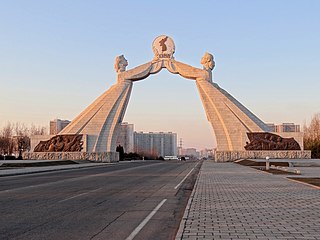
The Arch of Reunification, officially the Monument to the Three-Point Charter for National Reunification, was a sculptural arch located south of Pyongyang, the capital of North Korea. It was opened in August 2001 to commemorate Korean reunification proposals put forward by Kim Il Sung. Made of concrete, the arch straddled the multi-laned Reunification Highway leading from Pyongyang to the Korean Demilitarized Zone. The arch appeared on postage stamps issued in 2002, 2015, 2016, and 2021. The monument was demolished in January 2024.

The Kim Chong-t'ae Electric Locomotive Works (Korean: 김종태전기기관차연합기업소) in P'yŏngyang is North Korea's largest manufacturer of railway equipment. Established in November 1945 in Sŏsŏng-guyŏk, P'yŏngyang near the P'yŏngyang Railway University and the Korean State Railway's West P'yŏngyang Station, the factory manufactures and overhauls electric and diesel locomotives, passenger cars, streetcars and subway trainsets. It is subordinate to the North Korean Ministry of Railways.
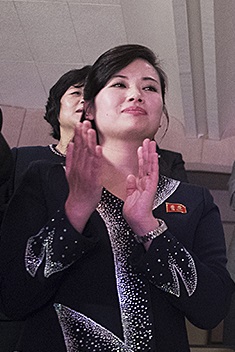
Hyon Song-wol is a North Korean singer, band leader, and politician. She is the leader of the Moranbong Band and of the Samjiyon Orchestra. She was formerly a featured vocalist for the Pochonbo Electronic Ensemble in the early 2000s, a pop group which found fame in North Korea in the late 1980s and 1990s. She has been a member in the Central Committee of the Workers' Party of Korea since 2017.

The Moranbong Band, also known as the Moran Hill Orchestra, is a North Korean girl group. Performing interpretive styles of pop, rock, and fusion, they are the first all-female band from the DPRK, and made their world debut on 6 July 2012. Their varied musical style has been described as symphonic because it is "putting together different kinds of sounds, and ending in a harmonious, pleasing result."

The Chŏllima Line is a rapid transit line owned and operated by Pyongyang Metro in Pyongyang, North Korea. The line has a depot at Sopo, near the Korean State Railway's Sopo station.

Military Foundation Day is an annual public holiday in North Korea falling on 8 February.

Ri Yong-ho is a North Korean politician and diplomat who served as Minister of Foreign Affairs of North Korea from 2016 to 2020.

The Samjiyon Band is a North Korean classical music ensemble.
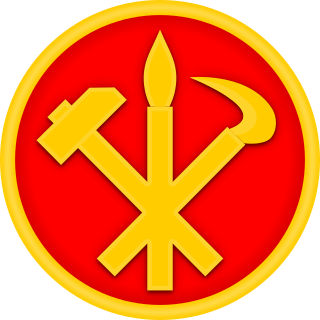
The United Front Department of the Workers' Party of Korea is a department of the Central Committee of the Workers' Party of Korea (WPK) tasked with relations with South Korea. It conducts propaganda operations and espionage and manages front organizations, including the Chongryon.

Ri Kyong Suk is a North Korean singer.
Choi Hee-tae is a North Korean politician who serves as chairman of the Pyongyang City People's Committee (mayor) and candidate member of the Central Committee of the Workers' Party of Korea.
















